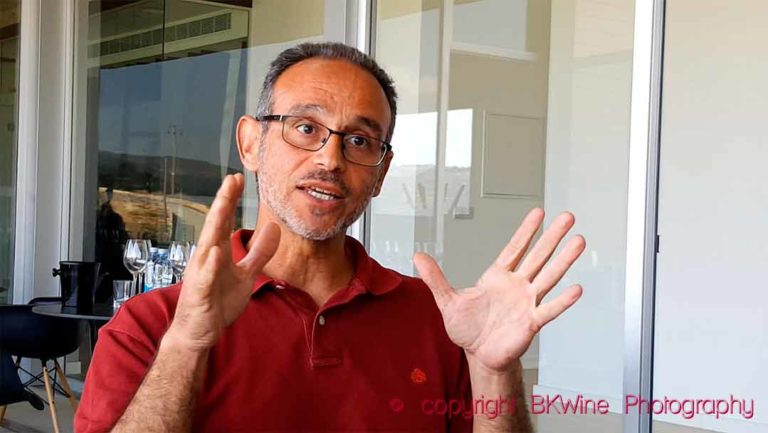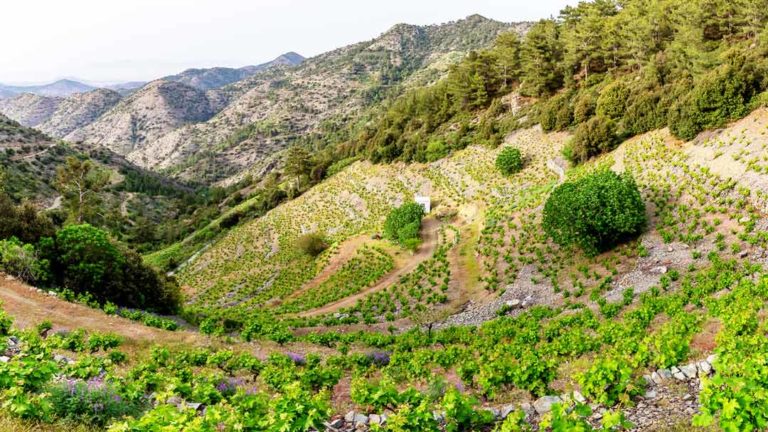A few thousand years ago in Paphos, Cyprus, Dionysus taught his lover Aphrodite how to cultivate grapes and turn them into wine. Today her Paphian namesake, Aphrodite Constanti, has taken up the goddess’ mantle to become Cyprus’ first female oenologist, at Vasilikon Winery. BKWine Magazine guest writer Matthew Stowell recounts the unusual and extraordinary career path of the modern days’ Aphrodite.
All through primary and secondary school, Aphrodite Constanti was an exemplary student. A quiet girl driven by an innate desire to succeed, she had a strong interest in the arts, especially photography—but contrary to form, she performed equally well in all her science courses. Once she matriculated high school and headed for university, she knew that the most logical and pragmatic subject to choose as a major would be chemistry, perhaps the most creative of the sciences.
At Thessaloniki’s Aristoteleion University she excelled in chemistry and related sciences but continued to feed her passion for art with two years of study in black-and-white photography and darkroom technique. She also kept a camera with her wherever she went, always poised to capture the perfect image. In the meantime, Aphrodite’s sister, Marianna, became an accomplished photographer and mixed-media artist, exhibiting work in solo and group shows in the major cities of Europe as well as in Egypt and China.
By the time Aphrodite had earned her degree in chemistry, she knew she didn’t want to follow obvious paths into lab work or teaching. She had to find a more artistic way to utilize her hard-earned scientific knowledge and experience. When she learned that the university offered a course in oenology (the science of winemaking) she was intrigued. But the oenology professor was on sabbatical that year.
As fate would have it, however, Aphrodite had a friend who worked at a local Epanomi winery and she paid her a visit. At the winery, the young chemist was impressed by the complex, variegated processes that winemaking entailed and sensed that she might have found the perfect marriage of her two loves, science and art. She decided to ask for a job, any job, in which she could learn more about winemaking.
The more time Aphrodite spent at the winery, the more attached she became to the notion of transforming something from the earth (grapes) and putting it through a natural chemical procedure to create an end-product that provided pleasure as well as health benefits to her fellow humans.
But if she was serious about oenology as a career, she needed more formal training. She sought advice from professionals in the field and decided the best course of action was to study oenology in France, the Mecca of winemaking, although she didn’t know a word of French. She promptly moved to France and embarked on an intensive study of the language of Voltaire and Rousseau.
Eight months of hard study later, she was confident about her language proficiency and she applied and was accepted to Bordeaux University for their prestigious two-year program in Oenology. The classes were very demanding but of equal importance to Aphrodite was the opportunity to be immersed in the culture of wine: to appreciate how wine was viewed as an essential element of French life, to live day in and day out in an environment that not only valued wine and its long history but also celebrated wine for its vital role in the nation’s legacy.
When Aphrodite was growing up in Paphos, Dionysus’ elixir was not a component of everyday life for most of her compatriots. Cyprus was still basically a beer-and-zivania drinking country despite the fact that before the Ottoman occupation, the island was famous around the world for its wine—its Commandaria (called nama then) winning the first international wine competition in Paris in the 13th century.
In France, the more Aphrodite learned about oenology and became immersed in the cosmology of wine, the more happy she was about her decision to avoid the usual career paths for chemists. “Oenology is much more artistic than other pursuits involving chemistry. To be a good oenologist, you have to know the science of it, but in the end, if you want to make something special, you must stop focusing on all the numbers and chemical equations and follow your instincts.”
After earning her Diplome Nationale Oenologie, Aphrodite remained in France to work at a small St. Emilion winery during its harvest period. Then, desiring experience with a grander scale operation that employed the latest technology, she relocated to New Zealand to work as part of a large comprehensive winemaking team. The following year saw her employed as assistant winemaker at the renowned Domain Sigalas winery of Santorini, the Greek island famous for its delicious white assyrtiko wines, a grape lately being cultivated and made into promising wines at several Cypriot vineyards.
In 2009, Aphrodite came home to Cyprus, unsure of her next step. It so happened that the Kyriakides brothers of the Vasilikon Winery in Kathikas, Paphos, were searching for a formally-trained oenologist/winemaker to help expand their repertoire. The knowledge and expertise they had learned from their father and from several winemaking courses had served them well—they had been successful with three excellent wines for 17 years—but now it was time to add some new labels. Through the grapevine, as it were, they heard about the talents and ambitious work ethic of Aphrodite, and in 2010 they contacted her for the new position, which she accepted.
“If you think about it, it was a bold move on the part of the brothers to hire a woman in a field almost completely dominated by males. Which doesn’t mean that from the first day, I didn’t have to prove myself just as capable as the men in every aspect of winemaking. It was necessary for me to know and become proficient at every stage of the process, from the initial planting of new vines to their cultivation and vinification into wine. No one was used to—or completely comfortable with—being directed by a woman in such a traditionally masculine industry, so this wasn’t easy. But the Kyriakides brothers have been very open-minded, and my opinions and ideas were listened to and respected.”
The winery had been planning for some time to produce a rosé and a high-end, 100% maratheftiko. They were happy to find that Aphrodite was just the person to nurture those projects (among others) through to fruition. And the results were impressive. Her first rosé won a Diamond Medal in an international competition and her efforts since then have garnered several more awards here in Cyprus and abroad.
“I can’t think of another profession I might have chosen that would be as strenuous but also provide so much personal job satisfaction. It’s so gratifying, for example, when someone approaches me to say they chose my wine for their wedding and that it added to the joy of that special occasion.”
In addition to her day-to-day work at the winery, Aphrodite represents Vasilikon at many exhibitions, conferences and competitions, and she enjoys this role to the fullest. She is particularly proud that her hard work has brought her numerous medals at the Women and Wine awards in Monaco.
“Winemaking is a tough job all round,” she says, “but a woman’s got to do what a woman’s got to do.”
More on the Vasilikon Winery here.














